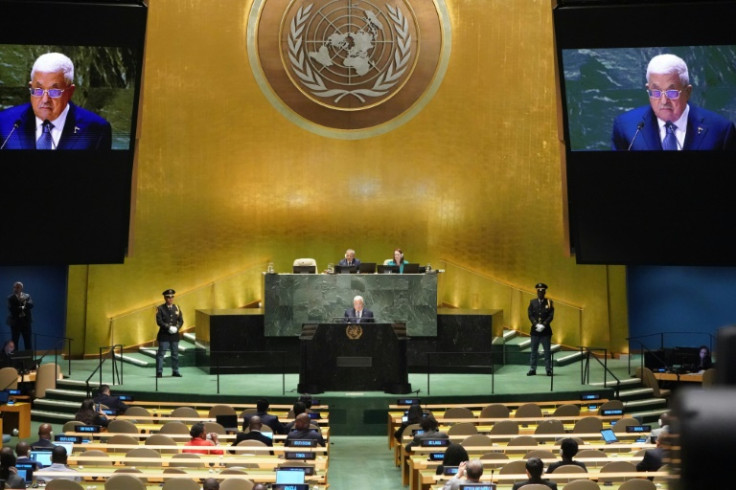Thwarted By US, Palestinians Look To UN General Assembly

After a US veto foiled the Palestinians' drive for full UN membership, the General Assembly is expected on Friday to grant them some additional rights in the global body -- a symbolic win that has already irked Israel.
With the war in Gaza raging, the Palestinians in April relaunched a request dating back to 2011 to become full members of the United Nations, where their current status is a "non-member observer state."
To succeed, the initiative needed a Security Council green light and then a two-thirds majority vote in the General Assembly.
But the United States -- one of five veto-holding members on the Security Council and Israel's closest ally -- blocked it on April 18.
Now the Palestinians are turning to the General Assembly, where diplomats and observers say a resolution calling for their full UN membership is likely to win broad majority support.
The draft resolution, introduced by the United Arab Emirates, says "the State of Palestine is qualified for membership in the United Nations in accordance with article 4 of the Charter and should therefore be admitted."
It calls on the Security Council to "reconsider the matter favorably."
That is unlikely to occur, as the United States opposes any recognition of statehood outside of a bilateral accord between the Palestinians and Israel, whose current right-wing government is adamantly opposed to a two state solution.
"You could have a sort of diplomatic doom loop, with the Assembly repeatedly calling for the Council to grant Palestine membership and the US vetoing it," said Richard Gowan, an analyst with the International Crisis Group.
The draft resolution nonetheless gives the Palestinians certain "additional rights and privileges" starting in the next session of the General Assembly, in September.
The text explicitly rules out letting them be chosen to sit on the Security Council or to vote in the General Assembly.
But it would let the Palestinians submit proposals and amendments directly, without having to go through another country, as is the case now.
It would also give them the right to be seated among member states in alphabetical order.
"When you build a building, you build it one brick at a time. If some think it's symbolic, for us it's important as we are moving forward towards our natural and legal right to be a full member of the UN," Palestinian ambassador Riyad Mansour told reporters Thursday.
"The symbolism is what matters," said Gowan. "This resolution is a very clear signal to Israel and the US that it is time to take Palestinian statehood seriously."
Israel has criticized the initiative, with ambassador Gilad Erdan saying it will "grant the Palestinian Authority the rights of a state de facto" and violates the UN Charter by "bypassing the Security Council."
The United States also expressed reservations.
"We're concerned about the precedent it sets," said deputy US ambassador Robert Wood.
An earlier draft of the resolution was more vague, granting "the State of Palestine the rights and privileges" necessary to take part in the work of the assembly "on equal footing with Members States" but without specifying what rights.
The new version is in line with the UN charter, said Samuel Zbogar, the ambassador of Slovenia, which currently sits on the Security Council.
"It makes clear what additional rights will Palestine get as observer but it doesn't touch on those elements that belong only the members," he added.
As Israel presses on with its war in Gaza against Hamas in response to the October 7 attack, the UN vote will allow the Palestinians to see which countries support them.
It may also show that -- were it not for the US veto -- the Palestinians would have enough votes in the assembly for full UN membership.
In December, 153 countries out of 193 backed a call for an immediate ceasefire in the Gaza war. Ten voted against, including the United States, while 23 abstained.
© Copyright AFP 2024. All rights reserved.











